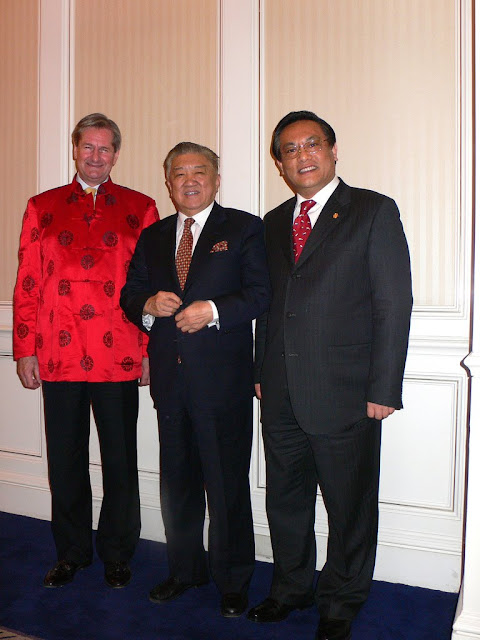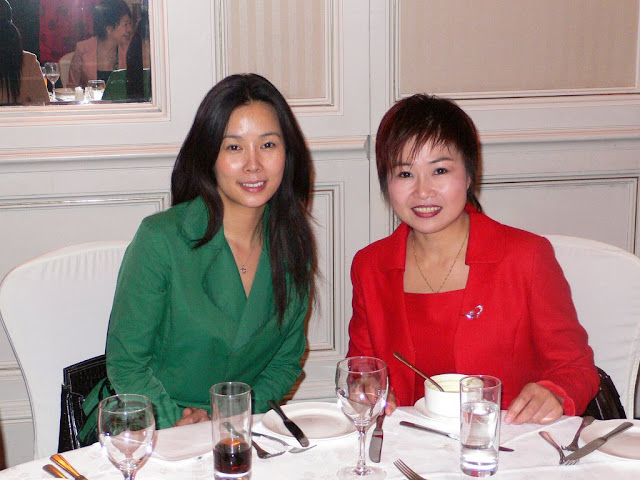 |
| The galleried floors at the Taj |
Click the heading for more photos of the Taj
This was originally an article written for Lloyd's List in 2006
My first visit to India - and to the Taj - was in 1972, when I accompanied Bill Birch Reynardson (later Miller's senior partner) on a visit. The UK Club had already established an interest in India in the '60s when Frank Ledwith made several visits in which he set up Rustom Mehta and his assistant Suresh Mankad from New India Assurance as the Club's correspondents.
 |
| Bill Birch Reynardson in 2013 |
I had been with Thomas Miller for about five years and my travelling - often with Bill Birch Reynardson - had until then been confined mostly to former Yugoslavia which, although beautiful, had communist-drab hotels and certainly nothing as richly magnificent as the Taj. Its stunning position overlooking the Arabian Sea towards what would later become Bombay High and its powerful Victorian architecture next to the Gateway of India, made an instant impression.
I had always been drawn to India partly because, like many Englishmen, I have family connections going back several generations through both the Lawfords and my mother's family, the Pughs. General Edward Lawford, an engineer, had commanded the garrison in Madras and Mysore in the 1850s and his younger brother, Lt-Col Henry (1812-1880) also served in Madras. Likewise Lt-Col Edward Melville Lawford (1826-1891) was Colonel of the 4th Madras Cavalry, while his younger brother, Henry Baring Lawford was Chief Judge of the High Court of Kishnagur. Further back, Edward Lawford, another lawyer, became wealthy as Solicitor to the East India Company and Clerk to the Drapers Livery Company, and had his home, Eden Park, described appreciatively by Pevsner in 'The Buildings of England'
It was thus with ribbons of family history behind me that we set up in rooms off the open galleries of the ‘old’ Taj, the new Taj tower not having yet been built. Bill Birch Reynardson took a suite with a fine dining room in which we entertained shipowners, government officials (such as the Director General of Shipping), lawyers and others at a long table flanked by white coated waiters. The ‘ordinary’ rooms were not lavish, but they had one marvellous attribute in that the windows could be thrown wide to let in the warm Arabian sea breezes bearing the scent of jasmine and spices. The sounds of hawkers, snake charmers and the daily thong of people who gathered on the seafront under one’s windows in the mornings and particularly in the evenings made the strongest sensory impression, and one that maintained my love for the Taj above all other hotels.

Sadly this magical experience can no longer be repeated, as they have finally replaced the old (and admittedly rickety) windows. The ‘new’ windows can only now be opened by calling on a member of staff - who has to be called back to close them again - and have no restraining bar so they can no longer be left wide open.
Needless to say I bought a Kashmiri carpet on that trip, and laid it out in my room. Bill Birch Reynardson was sure that I had been robbed but I was delighted with it, and it remains a prized family possession more than forty years later.
I returned to India in 1978 and spent three weeks travelling around the country visiting Calcutta, Delhi and Madras, and learning details of Indian maritime law and customs – and indeed Customs (with a large C) were one of the Clubs' major problems in those days as shortages and pilferage were rife in the docks and Customs enthusiastically raised Show Cause Notices for the infringements, sometimes years after the event. Indeed so egregious was the Customs Authority's behaviour that eventually the leading Indian lawyer, S Venkiteswaran (known to all as Venky) took a case to the Supreme Court and got the ancient customs penalties struck down on the grounds of natural justice.
On another occasion in the early '80s I dealt with a case involving Japanese owners who had suffered at the hands of an Indian bill of lading forger. The owner (now the president of the company) and I spent a two weeks meeting in the Taj trying to recover monies lost as the result of cargoes being delivered to criminal interests.
Needless to say I continued to stay at the Taj, learning to escape the heat and crowds in its great halls. In the gardens one watched the crows swoop down to grab sandwiches off guests’ plates. The food at the Taj was mostly indifferent, although the toasted chicken tikka sandwiches were excellent, but they made their own crisps and the most delicious home made ginger ale, so strong that it had to be drunk with brandy or it would take the back of your throat off! Sadly neither of these delicacies are available any more. Visiting regularly in the 1980s in furtherance of ITIC's business in India - the agents there being understandably concerned about the long tail customs penalties - I got to know some of the Taj staff, two of whom have remained friends to this day, and I am godfather to one of their children
 |
| The pool at the Taj |
One of my Miller colleagues, Robin Travis, took over the P&I role in India when I became involved with ITIC, and I joined him on occasion entertaining the Indian maritime community at cocktail parties next to the pool at the Taj; splendid events on warm evenings under dark blue velvet skies. In those days - and until quite recently - Bombay was a "dry" city, alcohol being allowed only if you could show that you were a registered alcoholic, so one had to bring in spirits. But this never seemed to result in any shortage at parties.
Later, in the early 90’s, serious rioting broke out in the city, with mobs overturning buses and burning cars. As it wasn’t safe to travel to the airport, I was stuck at the Taj for three days until the brave correspondent, Capt Sundareshan, drove me safely past the throngs and I was able to get on a plane
Another vagary of the hotel, although probably not entirely of its own making, used to be its fantastically poor telephone system. As laptops began to be carried in the '90s and we attempted to gather our e-mail from our servers back in London, hours would sometimes pass on lines so poor that one sometimes had to leave the system connected all night in order to get important documents. In fact it was far cheaper, even after acrimonious correspondence with the hotel management to get the hotel telephone bills reduced by 70 or 80%, to go back to fax.
The service at the Taj declined during the '90s until, prompted by the rise of the Oberoi on the other side of Nariman Point, the hotel pulled itself together and it is again smart and well run. The service has improved back to the level of the 1970s with of course the addition of modern communications and equipment in the rooms. Unfortunately, though, the food is still not the best and is far better at the Oberoi. On a recent visit, too, a companion who I was entertaining in one of the lounges was scratched on the ankle by a rat, which produced a low-key furore amongst the staff.
As is obvious, the Taj is built back to front, supposedly as a snub to the British. The hotel should stretch its two long wings magnificently towards the sea, but in fact it embraces the city behind. Consequently there are far fewer rooms facing the ocean than there should be - and I now find it almost impossible to get a sea view room. However, with the windows now sealed there is much less pleasure in watching the sun rise over Bombay High.
Shirt and suit makers still ply their trade in the shops on the ground floor. The shirts are fine, and all my business shirts come from there. Doubtless I pay more for them than I would do if I hunted down bargains in the city, but the convenience of walking in on the way back from a day's work and ordering three more "as per last" to be delivered to one's room in a day or two, makes them irresistible. Suits are however another thing. I once had a safari suit made, being told by the correspondent that this was what well dressed Englishmen should wear to conduct business in Bombay. The suit was duly produced but I hadn't reckoned with the fact that styles were many years behind Europe, and it sported huge bell bottoms. Needless to say it was never worn and I continued to stick boringly to a City suit. Attempts at a silk suit also failed. The cloth itself seemed fine, but what I failed to understand was that the quality of the ‘innards’ (the canvas and padding that are essential to a comfortable suit) were of an inferior quality compared to those used on good suits in London. Again an unworn suit and a lesson (rather more expensively) learned.
One of my fondest memories of the Taj was of an occasion when I was not there at all. My nephew's then girlfriend Sam Asprey took a backpacking trip around India with two other friends and before she left I gave her a sealed envelope, only to be opened when she reached Bombay - which would be after several months dusty travel. When she got there she opened the envelope and found an invitation for two nights at the Taj for her and her friends. I can still hear the squeals of delight from the phone call they made to me that night.
Herry Lawford
24th February 2006


